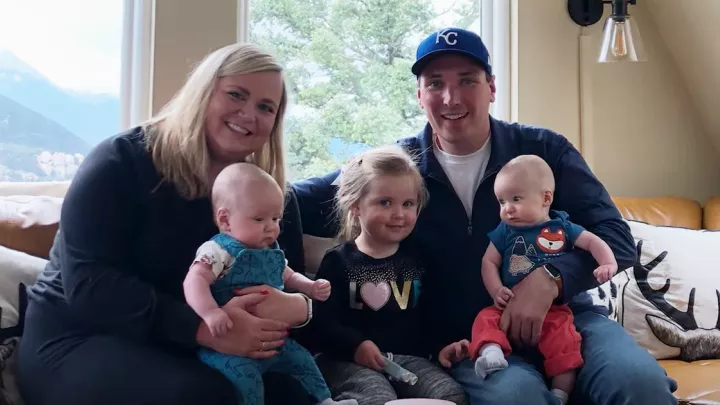How scalp cooling helped Omaha woman slow hair loss during chemotherapy

When Chelsea Slattery and her fiancé, Charlie, set a June 2020 date for their perfect wedding, they never expected so many hurdles. If a delayed opening of their historic Omaha wedding venue and setbacks due to COVID-19 weren't enough, Chelsea then found a lump in her neck.
"I found the lump in March, our wedding date was in September," recalls Chelsea. "By the time I had the biopsy it was May – the week after my bridal shower – and close to when we needed to send out invitations. It was a stressful time and I was really worried it was cancer."
After visiting several doctors and an original diagnosis of follicular lymphoma, Chelsea decided to get another opinion. "When I researched lymphoma, I saw a lot of great articles about Dr. James Armitage with Nebraska Medicine," says Chelsea. "I was fortunate to get an appointment quickly. He was such a kind and caring man. I left feeling so much more optimistic. He gave me advice that I'll remember for the rest of my life."
After further testing, a portion of Chelsea's cancer had transformed to an aggressive form of non-Hodgkin's lymphoma. She needed to start chemotherapy right away.
The type of chemo Chelsea received isn't necessarily known to affect fertility, but the couple wanted to have a backup plan. "A couple of weeks later, Charlie was kneeling on the kitchen floor with a syringe to my stomach to begin fertility treatments," explains Chelsea. "With the impending chemo date getting closer, I had the thought to move the wedding again – but up this time. I found a date that miraculously worked for everyone – July 29, 2021. We basically planned a wedding in three or four weeks, while freezing my eggs and starting chemo."
"I made a lot of calls because it was important that people knew although I had cancer, everything was going to be OK," says Chelsea. "Looking back, it was the best decision we ever made. The day couldn't have been more perfect and the room was absolutely radiating with love."
Hair loss – a big concern for many facing chemotherapy

Chemotherapy works by attacking fast-growing cancer cells. Hair cells grow fast too, which is why hair loss can be a distressing side effect. With her wedding day quickly approaching, Chelsea wanted to keep as much of her long hair as possible for the big day.
Dr. Armitage told her about the Paxman scalp cooling treatment, adding that while it's not guaranteed, some studies have shown good results depending on the chemotherapy regimen. Many studies found that people lose less hair when scalp cooling is used compared to when it's not used.
Chelsea went ahead and got fitted for a cap. "Everyone I talked to said I would start losing my hair two weeks after my first treatment and our new wedding date was day 17 after chemo," says Chelsea. "I was cutting it close, but hoping it would allow me to keep my hair long enough so I wouldn't have to wear a wig at the wedding."
How does Paxman scalp cooling work?
Scalp cooling has been used in Canada and parts of Europe for years. It has more recently been used in the U.S. since the Food and Drug Administration (FDA) approved scalp cooling in 2015.
A cold cap is a snug-fitting, helmet-type hat filled with a gel coolant chilled to between -15 and -40 degrees Fahrenheit. Worn during chemotherapy infusions, the treatment narrows the blood vessels beneath the scalp's skin, reducing the amount of medicine that reaches the hair follicles. Decreasing hair follicle activity is also thought to slow down cell division, making the follicles less affected by chemotherapy.
Chelsea recommends taking a pain reliever like acetaminophen for discomfort beforehand. Most people can tolerate scalp cooling, but about 30% to 50% of the time people have side effects such as headaches, nausea, scalp pain or feeling chilly.
"I did end up going to get fitted for a wig just in case, but I luckily didn't end up needing it," adds Chelsea. "The treatment definitely delayed the hair loss, but ultimately after six treatments I did end up losing about 80% of my hair."
Moving on after cancer treatment
Having finished chemotherapy, Chelsea feels fortunate to have found a medical team she could trust with her life. "I can't say enough good things about my experience with Nebraska Medicine," says Chelsea. "Dr. Armitage patiently answered all my many questions and Brittney Sturgeon, my case manager, made me feel so comfortable. I am happy to report that I am officially cancer free! I'm so excited to put this chapter behind me and I'm ready for a new year, with a new perspective on life."
"Giving patients options to preserve their hair is empowering," says Rachael Schmidt, director of the Nebraska Medicine Cancer Survivorship Program. "Scalp cooling can help improve patient's quality of life by maintaining their self-esteem and sense of well-being during treatment."

Talking about her cancer journey with friends, family and a therapist who specialized in helping those dealing with cancer helped Chelsea feel better. "It is so important to have a strong support system to process and express your feelings. My therapist said to me ‘you realize you probably saved someone's life by talking about it right?' That made it all worth it. If you are facing cancer treatment, know that it will soon be just a chapter in your life. Always trust your intuition and be your best advocate."





